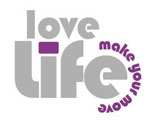loveLife, the HIV-prevention programme for young people, is running a blog until 10 December, 2012, to give people the chance to share their stories, express their views and take a stand against abuse, as part of its efforts to raise awareness of abuse and empower youths to tackle it.
Well-known personalities, such as Afro-pop star Kelly Khumalo and online marketing guru Khaya Dlanga, are also contributing to the blog. Others having their say are writers on loveLife's media team, readers of loveLife's UNCUT magazine and members of the organisation's social media sites.
The blog, which is available on www.lovelife.org.za will run throughout the 16 Days of Activism for No Violence Against Women and Children until 10 December (International Human Rights Day).
Blogs, which are uploaded on a daily basis, are linked to loveLife's Nakanjani Campaign. Launched in June 2011, the campaign encourages young people to take charge of their destinies no matter their circumstances. The campaign encourages youths to show resilience, perseverance and determination in dealing with adverse circumstances and changing their lives for the better.
Stories of courage and resilience
Stories highlight that everyone has the right to control over their bodies and minds and that no one has the right to abuse. There are also stories of courage and resilience in triumphing over violence and abuse. The power of education in helping to shield one from abuse will also be emphasised.
On the blog, you can find a range of open, honest pieces including one from Kelly Khumalo, who speaks exclusively to loveLife about her experiences of violence and her turbulent relationship with Jub Jub.
Taking a unique angle, Khaya Dlanga puts the spotlight on love, abuse and money. He looks at how men sometimes use money to get sex and how women can be dishonest about their true feelings, pretending to love a guy when all they're really after is his assets and his cash.
Not only does the blog offer an easy-to-access space for frank open expression on every aspect of abuse, it also provides practical tips for anyone experiencing abuse. Readers can find out about resources, such as loveLife's Youth Line on 0800 121 900 and Plz Cal Me service on +27 (0)83 323 1023, where they can access free and confidential telephonic counselling.
Information and advice
Articles also feature information and advice in topics ranging from emotional, mental and financial abuse right through to raising sons who don't abuse.
Speaking about the blog, loveLife's head of media, Beathur Mgoza Baker, said: "It is a unique way to highlight the devastation wrought by abuse by giving people the opportunity to share experiences of their own and others' abuse.
It also serves as an empowerment tool, offering information on where to get help and fostering healing through providing a platform for survivors to express difficult thoughts and feelings. Readers can find out about experiences similar to their own and gain strength in the knowledge that they are not alone."
Through the blog, people are empowered with ways that we as a society can more effectively tackle our high levels of violence.
As part of the 16 Days of Activism for No Violence Against Women and Children, loveLife has also partnered Kudzanai Chiurai - winner of this year's FNB Art Prize - to host an art therapy workshop with 16 young survivors of abuse. Together with Chiurai, they will paint pictures, which will be showcased on the blog.
Young people from across South Africa will also share stories of triumph over abuse in audio clips and video footage on the blog.
All loveLife initiatives during the 16 Days of Activism for No Violence Against Women and Children are underpinned by the organisation's range of media products, services and outreach programmes on the ground. These programmes are implemented nationwide by loveLife's corps of more than 6000 youth leaders, known as groundBREAKERS and Mpintshis.
loveLife's healthy sexuality and positive lifestyle programmes include modules to give youths the knowledge, skills and attitudes to stand up to abuse. A key component of these programmes is discussions around sexual rights, gender equality, different kinds of abuse and the importance of a healthy self-esteem.
Youths with a good sense of self-esteem tend to value themselves too much to stay in abusive relationships. By choosing healthy relationships, they lower their risk of contracting HIV as it is easier to demand condom use and stand up to an unfaithful partner.






























